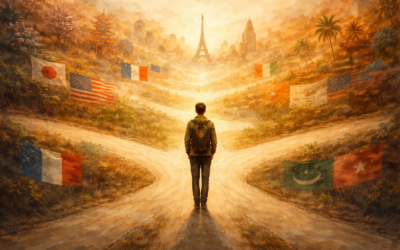Borders are inventions that became cages, and the harms that spill from them, wars, flight, and the theater of “illegal immigration” are the predictable churn of lines we first imagined, then enforced with walls, checkpoints, and stories about who belongs and who does not. The crisis is not only at borders; it is the border logic inside us, the reflex to slice a continuous human world into defended fragments and to confuse these fragments for the whole.
We call people “illegal” and then build policies to contain the consequences of that naming, mistaking symptoms for causes and patrols for solutions, while the drivers violence, collapsed livelihoods, extraction, and geopolitical aftershocks keep moving people because survival outranks paperwork every time. Borders do what they were built to do: sort, exploit, and exclude, converting displacement into precarity and precarity into cheap labor, all while telling a moral story that the suffering was orderly, necessary, even righteous.
It is fashionable to argue that opening the gates would drown us, that the ocean of need will swallow the boat, but evidence and history point to more mixed, manageable tides; it is politics that prefers the panic, because panic funds the walls that failure demands. The spectacle persists: leaders promise control, expand detention and militarization, and then campaign on the fallout of their own design, a feedback loop of fear that treats human motion as an emergency instead of a constant.
The heresy is simple: borders could be treated as places of relationship instead of rupture, corridors of obligation rather than moats of suspicion, where cooperation targets root causes and mobility is governed for dignity, not theater. This does not require naïveté; it requires abandoning the fantasy that sharper lines make safer lives, and admitting that our partitions often protect our conscience more than our communities.
Discontent is the beginning, not the end: a refusal to keep calling fire alarms “floods,” a decision to stop repairing the lock while the house burns, and a commitment to policies that make movement less desperate because staying becomes survivable. If we created the lines, we can redraw the terms, less fortress, more forum so that sovereignty is measured by how well it sustains human beings, not how cleanly it expels them.




0 Comments